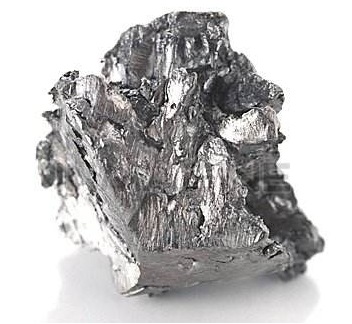Dysprosium Chemische Eigenschaften,Einsatz,Produktion Methoden
R-Sätze Betriebsanweisung:
R11:Leichtentzündlich.
S-Sätze Betriebsanweisung:
S22:Staub nicht einatmen.
S24/25:Berührung mit den Augen und der Haut vermeiden.
S36/37/39:Bei der Arbeit geeignete Schutzkleidung,Schutzhandschuhe und Schutzbrille/Gesichtsschutz tragen.
S33:Maßnahmen gegen elektrostatische Aufladungen treffen.
S16:Von Zündquellen fernhalten - Nicht rauchen.
Chemische Eigenschaften
metal ingots
Physikalische Eigenschaften
Dysprosium is a dense (specific gravity = 8.540) metal. It is soft, and when cut with aknife, it appears as a silvery metal that oxidizes slowly at room temperatures. The white oxide(Dy2O3) that forms on the outside of the metal sloughs off, exposing a fresh surface of themetal for more oxidation. The oxide of dysprosium is also called dysprosia.

Its melting point is 1,412°C, its boiling point is 2,567°C, and its density is 8.540g/cm
3.
Isotopes
There are a total of 39 isotopes of dysprosium, seven of which are stable. Theatomic mass of the stable isotopes ranges from 156 to 164 amu (atomic mass units oratomic weight). The unstable isotopes of dysprosium have half-lives ranging from 150milliseconds to 3.0×10
+6 years. All of the unstable isotopes are radioactive and are producedartificially.
Origin of Name
The word dysprosium was derived from the Greek word dysprositos,
which means “difficult to approach.”
Occurrence
Dysprosium is the 43rd most abundant element on Earth and ranks ninth in abundanceof the rare-earths found in the Earth’s crust. It is a metallic element that is usually found asan oxide (disprosia). Like most rare-earths, it is found in the minerals monazite and allanite,which are extracted from river sands of India, Africa, South America, and Australia and thebeaches of Florida. It is also found in the mineral bastnasite in California.
History
Dysprosium was discovered in 1886 by
Lecoq de Boisbaudran, but not isolated. Neither the oxide
nor the metal was available in relatively pure form until the
development of ion-exchange separation and metallographic
reduction techniques by Spedding and associates about 1950.
Dysprosium occurs along with other so-called rare-earth or
lanthanide elements in a variety of minerals such as xenotime,
fergusonite, gadolinite, euxenite, polycrase, and blomstrandine.
The most important sources, however, are from monazite and
bastnasite. Dysprosium can be prepared by reduction of the
trifluoride with calcium. The element has a metallic, bright
silver luster. It is relatively stable in air at room temperature,
and is readily attacked and dissolved, with the evolution of hydrogen,
by dilute and concentrated mineral acids. The metal
is soft enough to be cut with a knife and can be machined
without sparking if overheating is avoided. Small amounts
of impurities can greatly affect its physical properties. While
dysprosium has not yet found many applications, its thermal
neutron absorption cross-section and high melting point suggest
metallurgical uses in nuclear control applications and for
alloying with special stainless steels. A dysprosium oxide-nickel
cermet has found use in cooling nuclear reactor rods. This
cermet absorbs neutrons readily without swelling or contracting
under prolonged neutron bombardment. In combination
with vanadium and other rare earths, dysprosium has been
used in making laser materials. Dysprosium-cadmium chalcogenides,
as sources of infrared radiation, have been used for
studying chemical reactions. The cost of dysprosium metal
has dropped in recent years since the development of ionexchange
and solvent extraction techniques, and the discovery
of large ore bodies. Thirty-two isotopes and isomers are
now known. The metal costs about $6/g (99.9% purity).
Charakteristisch
Dysprosium, with characteristics similar to most of the other rare-earths, was difficult todiscover. Although dysprosium does not react rapidly with moist air at low temperatures, it does react with water and the halogens at high temperatures. It also reacts in solutions of weakacids. At low temperatures, dysprosium is strongly magnetic.
Verwenden
Dysprosium is most commonly used as in Neodymium-iron-boron high strength permanent magnets. While it has one of the highest magnetic moments of any of the rare earths (10.6uB), this has not resulted in an ability to perform on its own as a practical alternative to Neodymium compositions.
It is however now an essential additive in NdFeB production. It is also used in special ceramic compositions based on BaTiO formulations.
Dysprosium is used, in conjunction with Vanadium and other elements, in making laser materials and commercial lighting. Nanofibers of Dysprosium compounds have high strength and large surface area. Therefore, they can be used to reinforce other materials and as a catalyst.
Recent research has examined the use of Dysprosium in Dysprosium-iron-garnet (DyFeG) and silicon implanted with Dysprosium and Holmium to form donor centers.
Dysprosium Metal is an important additive for NdFeB permanent magnets to raise the Curie temperature and improve temperature coefficiency. Another most promising use of high purity Dysprosium Metal is in the magnetostrictive alloy TEFENOL-D. There are also other applications for some special master alloys. Dysprosium Metal can be further processed to various shapes of ingots, pieces, wires, foils, slabs, rods, discs and powder. It is highly susceptible to magnetization, they are employed in various data-storage applications, such as in hard disks.
Definition
dysprosium: Symbol Dy. A soft silverymetallic element belonging tothe lanthanoids; a.n. 66; r.a.m.162.50; r.d. 8.551 (20°C); m.p. 1412°C;b.p. 2562°C. It occurs in apatite,gadolinite, and xenotime, fromwhich it is extracted by an ionexchangeprocess. There are sevennatural isotopes and twelve artificialisotopes have been identified. It findslimited use in some alloys as a neutronabsorber, particularly in nucleartechnology. It was discovered by PaulLecoq de Boisbaudran (1838–1912) in1886.
Hazard
Dysprosium nitrate [Dy
2(NO
3)
3] is a strong oxidizing agent and will ignite when in contactwith organic material. Most dysprosium salts are toxic if ingested or inhaled.
Dysprosium Upstream-Materialien And Downstream Produkte
Upstream-Materialien
Downstream Produkte

